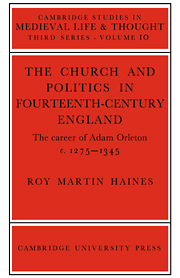Book contents
- Frontmatter
- Contents
- Preface
- Acknowledgements
- Abbreviations
- 1 APPRENTICESHIP
- 2 THE DIPLOMATIC ENVOY
- 3 THE DIOCESAN BISHOP
- 4 POLITICAL INVOLVEMENT
- 5 SUMMING UP
- APPENDIX I Worcester diocese: tables illustrating Orleton's administration
- APPENDIX 2 Letters and documents
- APPENDIX 3 Itinerary 1317–1345
- Bibliography
- Index
- Frontmatter
- Contents
- Preface
- Acknowledgements
- Abbreviations
- 1 APPRENTICESHIP
- 2 THE DIPLOMATIC ENVOY
- 3 THE DIOCESAN BISHOP
- 4 POLITICAL INVOLVEMENT
- 5 SUMMING UP
- APPENDIX I Worcester diocese: tables illustrating Orleton's administration
- APPENDIX 2 Letters and documents
- APPENDIX 3 Itinerary 1317–1345
- Bibliography
- Index
Summary
It was while I was working on a D.Phil. thesis in the late 1950s that Adam Orleton first came to my notice as one of the Worcester bishops. At the time I found no reason to dissent from the opinion commonly held of him – that of Stubbs and Tout – which has been generally adopted with scarcely a reservation. On a number of occasions I found myself returning to various stages of Orleton's career; editing his Worcester register, examining his tenure of the great see of Winchester, transcribing the ‘defence brief’ directed against his accusers of 1324, and reading papers about him in places as far apart as Durham and Kalamazoo. It soon became clear that the evidence used to convict him of moral turpitude – and worse – was in need of re-examination. Something of the kind was attempted by Canon Bannister, but in his anxiety to rehabilitate Orleton he adopted a number of Geoffrey le Baker's erroneous assertions and made of his ‘hero’ a political schemer in the Mortimer interest; in fact, for Bannister, the Mortimer connection provided the motivation for Orleton's adult life. Since the publication of Bannister's introduction to Orleton's Hereford register the reign of Edward II has been the subject of meticulous study and reinterpretation by scholars, notably T. F. Tout, J. Conway Davies and Bertie Wilkinson, and, more recently, J. R. S. Phillips and J. R. Maddicott.
- Type
- Chapter
- Information
- Church/Politcs:Adam Orleton , pp. ix - xPublisher: Cambridge University PressPrint publication year: 1978



